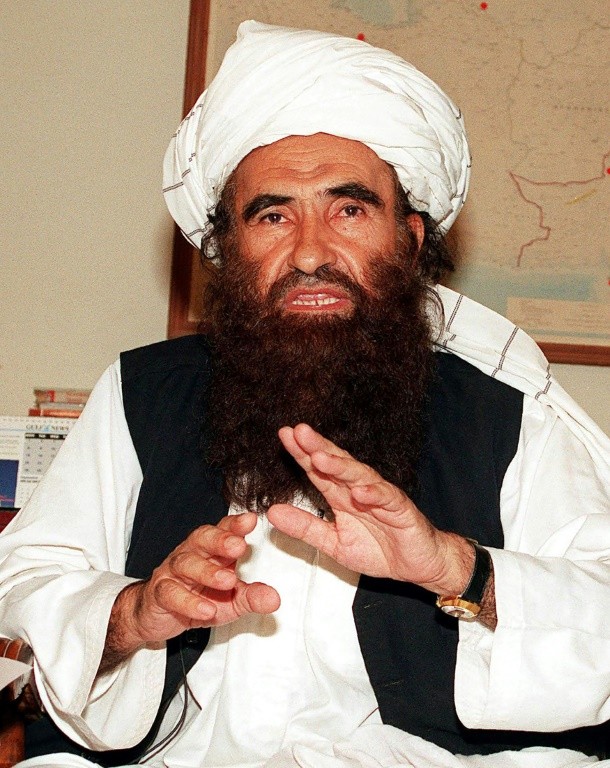Kabul (AFP) – Decades after forging reputations as anti-Soviet fighters during the Cold War, many of Afghanistan’s former mujahideen commanders still wield influence in the war-torn country, despite claims of gross human rights violations on their march to power.
Among them was former CIA asset turned brutal militant leader Jalaluddin Haqqani, who founded the eponymous Haqqani network that is now a top US target. His death was announced Tuesday by the Taliban.
Jalaluddin was among several mujahideen commanders who rose to prominence during the Soviet occupation of 1979-89. The survivors still have significant clout in Afghanistan’s ethnic and tribal-driven politics.
Their bravery and battlefield skills won them fame and assistance from the United States and Pakistan. Some, such as the resistance leader Ahmad Shah Massoud who was assassinated in 2001, attained folk hero status.
But after the Russians left, Afghanistan slipped into civil war as the mujahideen commanders sought to topple the pro-communist government and then turned on each other.
Figures little known in the West but etched into the memory of ordinary Afghans are accused of killing thousands of people during the bloody chaos of the early 1990s that fuelled the flow of millions of Afghans across the border into Pakistan.
After the Taliban was overthrown by a US-led invasion in 2001, several controversial figures from the previous two decades were brought into mainstream politics in hopes of ensuring a smooth transition to democracy.
The power and wealth garnered over decades of constant conflict helped the battle-hardened commanders in their new political careers — but also made them difficult to control.
Some kept private militias even as they ascended the political ranks, enabling them to enrich themselves and operate with impunity.
Here are four key figures:
– Hekmatyar –
The former prime minister is one of the most notorious warlords in Afghanistan’s history.
A prominent anti-Soviet commander in the 1980s, Gulbuddin Hekmatyar is accused of killing thousands in Kabul during the 1992-1996 civil war.
Following the 2001 US-led invasion and the fall of the Taliban government, the US State Department designated him a terrorist, accusing him of taking part in and supporting attacks by Al-Qaeda and the Taliban.
He returned to Kabul and mainstream political life in May 2017 following a peace deal between his dormant Hezb-i-Islami militant group and President Ashraf Ghani. The deal sparked revulsion from human rights groups and Kabul residents.
– Sayyaf –
The former anti-Soviet resistance leader and ally of Osama Bin Laden was a strident opponent of the Taliban and after 2001 went on to become a high-profile politician.
Abdul Rab Rasoul Sayyaf contested the 2014 presidential election before endorsing front-runner Abdullah Abdullah, who lost to Ashraf Ghani in a controversial vote.
Sayyaf, a religious scholar who remains influential despite retiring from politics, is said to have been the “mentor” of Khalid Sheikh Mohammed, the main plotter of the 2001 attacks on New York and Washington.
Sayyaf also ran militant training camps in Afghanistan and Pakistan throughout the 1980s and 1990s, which Mohammed attended.
– Mohaqiq –
Mohammad Mohaqiq fought the Soviet occupation before becoming embroiled in Afghanistan’s brutal civil war in the 1990s.
The most senior politician from the minority Hazara ethnic group, Mohaqiq contested the 2004 presidential election before becoming the second deputy to Chief Executive Abdullah Abdullah in 2014.
Mohaqiq has been an outspoken critic of President Ashraf Ghani’s government, accusing it, among other things, of trying to sideline mujahideen leaders.
– Dostum –
Abdul Rashid Dostum, a powerful ethnic Uzbek leader, is notorious for extreme barbarities and for repeatedly switching loyalties over 40 years of conflict.
While he fought on the side of the Soviets against the US-backed mujahideen in the 1980s, he played a key role in helping US Special Forces topple the Taliban in 2001.
Despite a catalogue of war crimes attached to his name and accusations of organising the rape and torture of a political rival, Dostum became Afghanistan’s first vice president in 2014.
He received a hero’s welcome when he returned to Kabul in July after more than a year in exile.

COMMENTS
Please let us know if you're having issues with commenting.